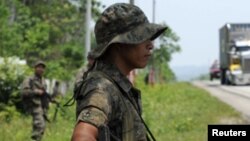Secretary of State Hillary Clinton travels to Central America this week to meet with regional leaders and other international partners to seek integrated solutions for greater citizen security in the seven nations of the region. Her trip to Guatemala for the International Conference of Support for the Central American Integration System, or SICA, follows a promise President Obama made in March, to help our neighbors combat and prevent narcotics, arms trafficking, strengthen their border security, improve the effectiveness of local law enforcement and judicial systems, and break up transnational criminal gangs.
Gangs and waves of drug- and arms-related violence have become major security challenges to Central American democracies. Public concern about crime tops other issues, even unemployment. According to the U.N., the area is the most violent in the world outside war zones. Increasingly, illegal immigration to the United States is not only fueled by poverty, but by safety at home. Regional cooperation is vital to addressing the problem, and the nations of the region must continue working to eliminate the root causes of crime and citizen insecurity.
The United States' partnership with our neighbors in Central America will strengthen ties and amplify our responses to concerns that affect all the Americas. Security is the right of every citizen, but each citizen and each government also has responsibilities. Along with partner countries like Spain, Colombia, Chile, Canada, Mexico, the E.U., and others, the U.S. is stressing the role of regional governments in strategically coordinating and sustaining long-lasting efforts to end violence and improve security.
Our country is doing its part too, supporting real programs to attack the problem, says Deputy Assistant Secretary of State Julissa Reynoso.
In Guatemala we've partnered to dramatically improve local police forces. In Honduras we've helped a Special Victims Task Force build capacity in investigation and prosecution. In El Salvador our technology transfer has modernized law enforcement. The U.S. and Nicaraguan navies collaborate to interdict drug shipments by sea.
This week's conference will find ways the governments of the region can better carry out programs to suppress regional violence crime and corruption that threaten citizens. We continue to encourage participating countries to support thriving democracies that must respect human rights, promote social justice and keep their citizens safe. They are crucial partners in future development and stronger opportunities for all residents of the hemisphere.
A Security Strategy For Central America

Secretary of State Hillary Clinton travels to Central America this week to meet with regional leaders and other international partners.






















